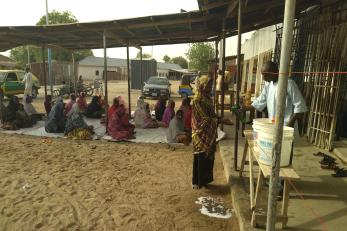Providing food for the vulnerable amidst COVID-19 outbreak

Amidst the scare of coronavirus outbreak globally and nationwide wide lockdown around the world, Mercy Corps Nigeria is doing what it takes to provide essential services in the form of food distributions.
When the news of confirmed coronavirus cases broke out in Nigeria, we had concerns about how vulnerable community members and Internally Displaced Persons (IDPs) will continue to receive life-saving commodities. However, prompt arrangements were made to ensure social distancing and safety for participants. Over 3 days, from 27th to 30th of March, participants in Bama LGA, Borno state received food items under the EU-funded ‘Borno Maida - Early Recovery’ program in Northeast Nigeria. Our participants were able to receive food items like - rice, maize, beans, groundnut, millet, guinea corn, garri, vegetable oil, palm oil, spaghetti, sugar, Maggi seasoning, salt, tomatoes paste and yam.
Although the target was to distribute food items to 4489 households, we were able to reach 4302 families consisting of 30,114 individuals within the 3 days of this activity.
Initially, the planned distribution was scheduled to start on the 26th but had to be suspended as a result of overcrowding, for the team to re-strategize. Joint meetings were re-convened with community leaders and vendors to re-strategize on how best to control the turnout of participants at distribution points to prevent crowd build-up.
It was agreed that community leaders will ensure that participants whose community is not called to participate in redemption for that day will not come to the redemption point at all to avoid overcrowding; vendors agreed on hard targets for a specific number of supplies they must provide per day. And the following mitigation measures such as providing clear entry and exit routes, provision of handwashing stations equipped with soap and alcohol-based hand sanitizers and use of a PIN instead of biometric, the team was able to timely distribute the food items and send the participants home. The plan is to adopt these measures across all implementation sites as we continue to provide vulnerable communities with food assistance and shelter.